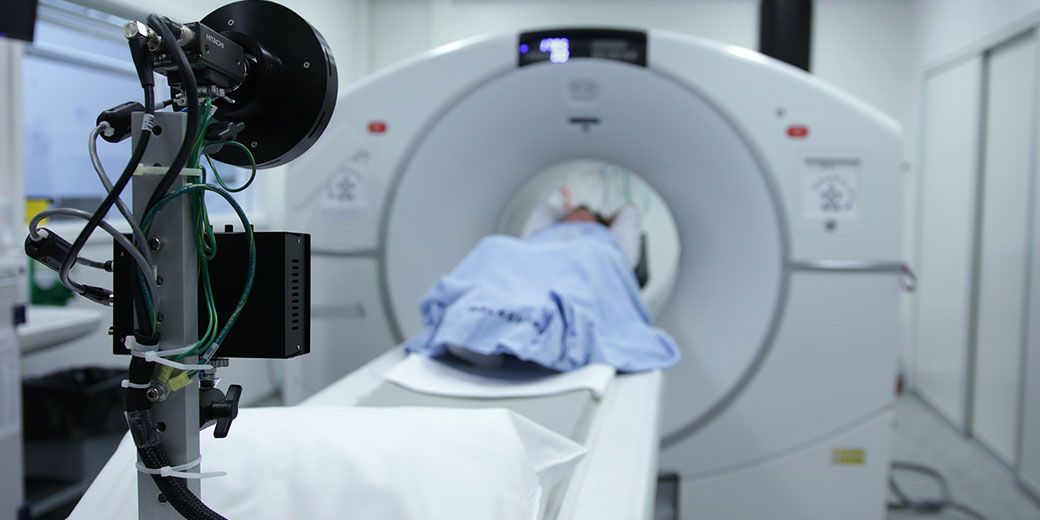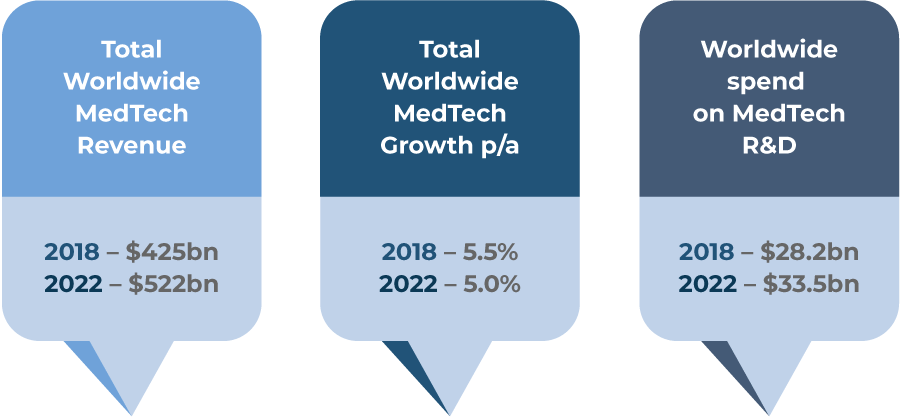
Significant contributions to healthcare are unfolding as Innovation continues to play a huge role in areas such as pharmaceuticals, biotechnology, IT, and medical device manufacturing. Advancements in medical devices, in particular, is crucial for the healthcare industry. For this sector, continuous improvement is key to life-saving innovations.
Certain technologies are on the rise in recent years such as the Internet of Things (IoT), Big Data, Artificial Intelligence (AI), and Machine Learning; the application of which has significantly added value to and transformed the healthcare industry. Physicians can now better diagnose and treat patients and therefore the dependence on medical technology cannot be overstated.
Expected MedTech Growth 2018-2022

 Micheál Coughlan, InterSearch Worldwide Life Sciences & Healthcare Practice Group Leader (InterSearch Ireland)
Micheál Coughlan, InterSearch Worldwide Life Sciences & Healthcare Practice Group Leader (InterSearch Ireland)
“If we see this growth over the next number of years, then medical technology will also have an impact on the number of jobs that are announced in areas such as research and development, continuous improvement and analytics. We are already seeing a high demand for talent in these areas today. The future of healthcare is dependent on the availability of such talents, and so it is very important that individuals are encouraged and attracted to work in these areas.”
One such area where the need for IT experts and analysts are rising is ‘Big Data’. Anyone familiar with this term knows that it has become a focal point in recent years within the digital world and is now heavily adopted within the healthcare industry. Thanks to Big Data, huge volumes and formats of data can be analysed by healthcare organisations to predict healthcare trends. With this and the connection between IoT and wearable healthcare devices on the rise, doctors can now access medical reports and data anywhere and anytime, making patients and doctors more easily connected.
 Rodrigo Donoso, InterSearch Worldwide Life Sciences & Healthcare Practice Group Regional Leader, Americas Region (InterSearch Argentina)
Rodrigo Donoso, InterSearch Worldwide Life Sciences & Healthcare Practice Group Regional Leader, Americas Region (InterSearch Argentina)
“Data plays such an essential role in the life sciences industry’s future. The U.S. is leading the way in which such healthcare innovation is advanced as IT companies such as Intel, IBM, and Cisco are continuously thinking of ways in which software and hardware technology can be connected with healthcare. Fortunately for Argentina, we are a key market for U.S. exports and such technology and products produced in the U.S. are highly regarded here. We are constantly on the lookout for talent with spectacular Life Sciences and IT backgrounds”.
A well-known example of technologies application in healthcare is diabetes care. We are seeing major developments in insulin and monitor pumps, and Big Data makes it possible for data on patient results to be logged on a patient-doctor portal. By cutting down the time it takes to access healthcare and results, it is reducing risk and saving lives. (Source) As the number of people waiting in line to see a doctor for various medical conditions decreases, we should also see healthcare costs decrease over time. Medical diagnosis has also improved through the adoption of AI and machine learning technologies. Patterns that could so easily be overlooked by a healthcare practitioner are being spotted through the use of algorithms. For example, devices are being developed that are utilising AI and cloud technology to detect certain health patterns and signals before an individual suffers a respiratory or cardiac arrest. The device picks up on signals such a decline in blood pressure or increase in heart rate and determines if someone is at risk based on their age and history. This offers terrific insights for preventative measures and treatment plans much earlier. The main concern with depending on so much data and so many algorithms is the inability to manage and track it all. More availability of talent within the areas of data analysis and IT would help with this. (Source)
 Lotika Mahindra, InterSearch Worldwide Life Sciences & Healthcare Practice Group Regional Leader, Asia Pacific Region (InterSearch India)
Lotika Mahindra, InterSearch Worldwide Life Sciences & Healthcare Practice Group Regional Leader, Asia Pacific Region (InterSearch India)
“Fortunately, the medical devices industry in India is rapidly expanding, contributing approximately 5% to the $96.7billion generated by the health sector each year. Presently, we have over 800 medical device manufacturers in the country. In terms of revenue and employment, the Indian healthcare industry has grown to be one of the biggest sectors in the country and is attracting more talent and foreign players. At this rate, our country is expected to contribute greatly to the global market share. By 2025 it is expected the contribution from our medical devices market to the global market will be around 30%. Some key players such as Beckton Dickinson, B Braun, and Lotus Surgicals are positively taking advantage of this growth and investing in innovation.”
Developments such as robotics in the healthcare will also increase the need for talent in areas such as engineering and automation. This technology is so advanced that surgeons do not have to be in the operating room to carry out a procedure. This is making surgeries less invasive and recovery time shorter. It also positively impacts waiting times, allowing patients to attend hospitals closer to home without the hassle of travelling to the surgeons’ practice. (Source)
 Yulia Zabazarnykh, InterSearch Worldwide Life Sciences & Healthcare Practice Group Regional Leader, CEE Region (InterSearch Russia)
Yulia Zabazarnykh, InterSearch Worldwide Life Sciences & Healthcare Practice Group Regional Leader, CEE Region (InterSearch Russia)
“This is only the beginning of the journey towards a more seamless delivery of patient care and we are already seeing major developments in Eastern Europe. Germany, the U.S., and China are our leading medical device suppliers in Russia. Some of the leading U.S. manufacturers in our country include Medtronic, J&J, GE Healthcare, and Stryker and it is these players and many others that are paving the way to advancements in healthcare technology.”
The common factor in all forms of medical technology is that it contributes to a longer and healthier life, thus improving the quality of the healthcare system. However, we can only continue to see such improvements with the availability of talented healthcare and MedTech practitioners. Now more than ever is the time for all countries and healthcare organisations to adopt further strategies to ensure continuous upskilling, starting with the pre-tertiary education of younger generations before they enter third level education. This will ensure that the future of MedTech is a positive one, that the leadership needed for the future is being developed now, and that the necessary talent is widely available.
 Frank Schelstraete, Chairman of the Board, InterSearch Worldwide (InterSearch Belgium)
Frank Schelstraete, Chairman of the Board, InterSearch Worldwide (InterSearch Belgium)
“As key players within the Executive Search Industry, InterSearch Worldwide appoint to hundreds of management and director-level positions within Clinical Research, Healthcare, Automotive, MedTech and IT sectors. We see how technological innovation is growing so fast that our clients are continuously seeking top talents within these sectors to lead change. It is our mission to find the talent needed today so that a welcome path is left for future healthcare practitioners and future breakthroughs.”
The InterSearch Life Sciences Practice Group is a global representation of InterSearch Countries actively engaged in
supporting InterSearch clients in the following industries:
Pharmaceutical, Biologics, Medical technologies, CRO (clinical research organisation), Healthcare, Pharmacies and Health Insurance. We identify the best candidates with sector experience in General/Division/Product management, Procurement, Materials, Manufacturing Plants, Engineering, Quality Assurance as well as Marketing & Sales, HR, Finance/Administration, Logistics and R&D.







